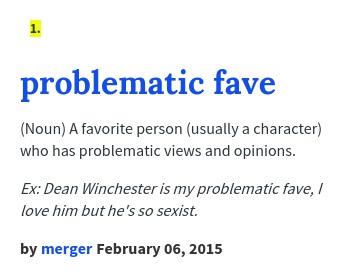Your Phrase Is Problematic

I’ve got bad news for you.
That celebrity whose style you adore? Said something super shitty. That politician whose quotes you will never not share on social media? Voted for some things you might not agree with. That show host you love is friends with this asshole.
In fact, your friends are problematic too. So are your loved ones. You basically need a whole new set of friends if you want to avoid anyone who has ever been wrong about social justice, in fact. But good luck finding them!
Why expect your favorite people to be perfect? Perhaps because you like them, and you’re a good person, they must be too, or else it reflects back on you. And while most people I know seem to be comfortable with the idea that no one is perfect in theory, we all seem to cling to this belief in practice that there is some human alternative to occasionally causing problems. I learned the phrase “no heroes” as a baby skeptic, and it becomes more important to me every year. No one person or piece of media can be above criticism.
In short, I’m kind of over the phrase “your fave is problematic.” The implication is that someone (the speaker, I’m guessing?) can ever be not-problematic. But problematic is the human default: we all mess up. More importantly, our cultural emphasis on individual mistakes—the essence of “call-out culture”—is a useless distraction from the oppressive systems in place at government and social levels that fuel what we do. Much as even the most self-described “socialist” of us may want to believe in free will, we’re less in control of our thoughts and actions than we think. Messages from the media and other power structures—which benefit from patriarchy, white supremacy, cisheteronormativity, the works—reinforce our prejudices.* And fear, the great human equalizer, is always ready to control us, making us shy away from anything Other and cling to our prejudices and positions of privilege with everything we’ve got.
In light of all that, I’m tired of pretending that anyone’s love of a designated-problematic individual is holding social progress back. Here’s a close-to-home example for me: I’m both a Kanye West fan and a sexual assault survivor. Kanye did not defend Bill Cosby recently because everybody knows he’s a motherfucking monster. We may never know exactly why he tweeted what he did, but I’d rather talk about the rape culture that makes this kind of apologia all too common. I’d rather examine the knee-jerk reactions of many people to defend their faves when they say something awful, because saying “Yeah, that sucked” would somehow implicate them personally in the wrongdoing by association. And I’d like to think that people are more likely to be led to rethink a mistake by their fans and friends than by someone who’s sworn off their work for eternity.
I’m grateful to those who have called me on oppressive behavior and language throughout my life; they didn’t have to take the time to educate me, but they did, and I learned. The times when I resisted? When I didn’t want to hear it and got sad and upset and made the whole thing about me? Those were the times when I most needed to take a seat and listen and then examine why this particular thing was so hard for me to concede. When it feels like “backing down” or a “slippery slope” to say, “Yeah, you’re right, I can see that this is a problem because X and it would be better to do or say Y instead,” that’s when you’re afraid of losing power, and we all need those moments—not just once, but over and over throughout our lives.
It’s worth noticing how certain Problematic Faves get called out, too. How many fans of Woody Allen have dismissed his crimes, with no analysis or clear condemnation, in light of his “net positive” contributions to film? Reducing people to a pro/con list of accomplishments and fuckups ignores a lot of society-level factors, including privilege–it’s easier for straight, white, cis, and/or male figures to access mainstream forgiveness on the basis of their “net worth” as public figures. And look at the magnanimous treatment of Rachel Dolezal, with folks rushing to excuse her appropriative actions without even condemning them while black women never enjoy such benefit of the doubt. The nature and timing of forgiveness do not exist in a social vacuum.
So rather than a rolodex of Problematic Faves from folks who pop up for ally theatre like clockwork to remind you that This Person You Like Did A Bad Thing And You Need To Disown Them Or You Won’t Be As Good An SJW As I Am, I’d be more interested in a database of Faves Who Were Called On Problematic Shit And Were Total Babies About The Whole Thing And Keep Doing It, Why?
Or, if you really want to be helpful: Problematic Behaviors That We See All The Damn Time, Examples From Pop Culture, Why They’re Problems, And Better Alternatives Since Clearly This Is A Systematic Thing. Because if we actually want to fix the problem, that’s where we have to start.
*As Austin Powers once said, “Groovy! Smashing! Yay, Capitalism!”





I use it sometimes, like when people mention Gandhi (an apologist for apartheid and Nazi Germany, thank you very much). But it’s always specifically to shut down appeals to authority.